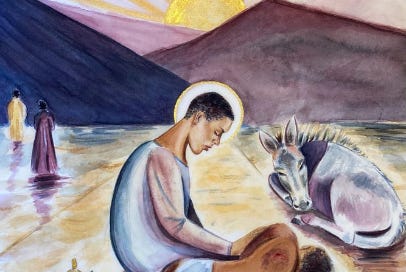As it is unacceptable that some have fewer rights by virtue of being women, it is likewise unacceptable that the mere place of one’s birth or residence should result in his or her possessing fewer opportunities for a developed and dignified life.
[…]
Nowadays, a firm belief in the common destination of the earth’s goods requires that this principle also be applied to nations, their territories and their resources. Seen from the standpoint not only of the legitimacy of private property and the rights of its citizens, but also of the first principle of the common destination of goods, we can then say that each country also belongs to the foreigner, inasmuch as a territory’s goods must not be denied to a needy person coming from elsewhere. (Fratelli Tutti 121, 124)
Continuing my series of posts about the Universal Destination of Goods (here’s the first and second posts on the topic), I wanted to resurrect an article I wrote for Where Peter Is a year ago about the pope’s encyclical Fratelli Tutti. In that document, Pope Francis frames the debate about the rights of immigrants vs. the rights of countries to regulate their borders in terms of the Universal Destination of Goods.
It’s a challenging, but absolutely necessary, teaching for Catholics…especially those of us in the United States. Our current president is a Catholic who has quoted Fratelli Tutti but is not living up to the standards set by the Church when it comes to the rights of migrants. His predecessor was a proud nationalist who went out of his way to abuse immigrants. And his predecessor was known as the “Deporter-in-Chief.”
Here’s the introduction to my article. Please read the whole thing here.
I don’t think Pope Francis is recognized enough for his skill as a theologian. It is the Pope Emeritus who is, rightly, widely recognized as possessing a brilliant theological mind. Francis, on the other hand, is seen as the great pastor, or, as Austen Ivereigh recently put it, “the world’s spiritual director.” I have definitely been pastored by the pope. I’ve said often that if it wasn’t for Pope Francis showing me the mercy and grace of God our Father I don’t know if I’d still be Catholic.
However, there are moments when I think Francis teaches a particularly brilliant theological point. If he were just a theologian I’d call it clever, but since he’s the pope I’ll say it’s inspired. His particular theological insights, I believe, come from his ability to read the signs of the times. His keen sense of what is really wrong in the Church and the world. Here I think of his teachings about pastoral accompaniment and neo-pelagianism (and there’s a lot I’ve written about them), but in this article I want to focus on a novel theological turn Francis made in Fratelli Tutti concerning immigration.
The plight of migrants and refugees has been one of the pope’s main talking points throughout his pontificate. Francis is very aware of rising xenophobia and Nationalism around the globe as well as a growing fear and scapegoating of immigrants and refugees, so he addresses the rights of migrants head-on. However, the way he explains those rights in Fratelli Tutti is something I’ve never seen before in Catholic Social Teaching.
Read the rest here.
Also, my wife, Kristina Fahey created this original painting of the Good Samaritan for the Where Peter Is Fratelli Tutti Study Guide. Go ahead and order prints or cards of this painting here.




